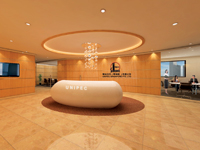
 Unipec ... ending dispute with Iran
Unipec ... ending dispute with Iran
THE National Iranian Oil Company has signed a new term crude supply agreement with Chinese trader Unipec for 2012, ending a dispute over payment terms and removing a major question mark that had overshadowed the prospects for Iran maintaining crude exports to China at volumes at or near previous levels.
“The agreement between the two companies has already been finalised and signed,” a source familiar with the matter says.
The deal between NIOC and Unipec, the trading arm of Chinese state-owned Sinopec, ends a dispute over payments, although it was unclear whether Unipec had accepted a reduction in the credit period to 60 days from 90.
But it was not all positive news for Iran, as it emerged that Japanese refiners were looking at ways of obtaining increased flexibility in their Iranian crude contracts, including a possible force majeure provision that would indemnify them from payment problems related to US financial sanctions.
And while India has stressed that it will continue to buy oil from Iran, the news that refiner Essar Oil does not plan to increase its volumes of Iranian crude despite a significant refinery expansion will be a disappointment for Tehran at a time when it hopes to reroute some 500,000 bpd to Asia once a European ban comes into force.
In addition, cash- and credit-strapped Greece, which has received crude from the Islamic Republic on favorable terms, said it was seeking alternative supplies to replace those from Iran ahead of the implementation of a European ban on Iranian oil.
Prior to sealing the Unipec contract, China, the world’s second-biggest oil consumer, and Iran already had concluded term crude supply agreements for 2012 totalling around 268,000 bpd. These included contracts for the supply of 260,000 bpd of Iranian crude to Chinese state-run importer/exporter Zhuhai Zhengrong and 8,000 bpd to ChinaOil, the trading division of state refiner PetroChina.
No details of Unipec’s term contract were available, including the volumes of crude oil and condensate and duration. A source with Unipec declined to comment when contacted about the contract. NIOC also refused to comment.
NIOC had proposed to supply 190,000 bpd of Iranian Light, Iranian Heavy, Soroosh and Sirri crudes and 75,000 bpd of South Pars condensate to Unipec under a new term contract.
In Japan, refiners have begun to weigh options for seeking flexibility in their Iranian crude import contracts, including the possibility of asking for force majeure clauses that could be invoked when payments cannot be made to Iran via bank transactions.
Petroleum Association of Japan President Akihiko Tembo told a press conference in Tokyo that refiners had been advised to reduce their imports of Iranian crude this year through what he called their “information exchange” with the Japanese government. “However, we have not been told specific figures for the reduction,” he says.
 |
NIOC ... signing deal with Unipec |
Tembo says refiners were looking at how to reduce their imports of Iranian crude and that one option was to seek contract flexibility, including force majeure provision, in individual negotiations with NIOC.
“We would lose our means to pay for [crude] if our banks became unable to process transactions,” Tembo says. “Then we would not be able to buy (crude) even if we wanted to buy it.”
Tembo’s comments come as Japan hopes to conclude its negotiations with the US State Department on how it can continue to trade with Iran without losing its access to the US financial system.
Japan hopes that by cutting back on its imports of Iranian crude its financial institutions will not be penalised, according to industry sources. Japan cannot order its refiners to reduce imports, but senior government and industry officials have said they expect to see imports from Iran, already significantly down from a few years ago, to fall further.
Japanese Foreign Minister Koichiro Gemba says Japanese officials participating in the negotiations with the US had given their Washington counterparts “specific numbers” for a possible reduction in Japan’s imports of Iranian crude imports.
India’s Essar Oil, meanwhile, is still importing crude from Iran but does not plan to increase its volumes despite the ongoing expansion of its refining capacity, its chief executive, LK Gupta, says.
“In the overall basket, the weightage of Iran crude is going down,” Gupta says during a conference call on the company’s latest quarterly results.
Essar will continue to import crude from Iran under contractual arrangements that extend to March 2013, he said, adding that annual contract volumes were almost unchanged at 5 million tonnes or 100,000 bpd.
“We are presently getting crude oil from Iran,” Gupta says. “Payment obligations are being met on due dates.” He adds that the company still owed around $1.2 billion to Tehran.
Essar Oil is expanding the Vadinar refinery from nameplate capacity of 10.5 mtpy and processing capacity of 14 mtpy to 18 mtpy. The first phase of expansion was completed by March. A further optimisation project would lift its capacity to 20 mtpy by September.
The refinery has already tied up ultra-heavy and heavy crude required post expansion, Gupta said, adding that in the case of any supply disruptions from Iran due to the toughening international sanctions regime, Essar would be able to tap into a wider supplier base from Latin America and the Middle East.
India has been having trouble making payments to Iran since December 2010 when the Indian central bank banned payments through the Tehran-based Asian Clearing Union. It has been using Turkey’s Halkbank to route payments for the 370,000 bpd of oil it currently buys from Iran since July last year, but this mechanism also has been thrown in doubt after the latest US sanctions which threaten to bar companies doing business with Iran from the US financial system.
Iran has now agreed to accept 45 per cent of the payment for its oil exports to India in rupees after recent negotiations with Indian officials.
India currently imports some $12 billion worth of crude from Iran and, according to oil minister S Jaipal Reddy, will continue to take Iranian crude.
But some refiners are looking at either marginally reducing term contract volumes with Iran or tapping additional sources to secure supplies in case of any interruptions to Iranian supplies.
Cash- and credit-strapped Greece is heavily dependent on Iranian crude which it buys on favourable terms that give 40 days of credit rather than the usual 30 days.
But Greece is already seeking alternatives to Iranian oil despite having increased its crude volumes from the Islamic Republic during its financial crisis, the country’s energy ministry says in a statement.
“Due to its difficult financial situation Greece has increased the provision of oil from Iran and imports from Iran today correspond to about one-third of total oil imports,” the ministry says, without giving volumes.
However, following the EU decision to ban imports of Iranian oil, the government is now “in discussions with its EU partners over finding alternative oil sources,” it says.
The International Energy Agency estimates Greece buys around 100,000 bpd of Iranian crude, about 20 per cent of Europe’s roughly 500,000 bpd of imports from Iran.
Greece’s move to replace its Iranian crude volumes comes as the country faces an energy crisis caused by disrupted natural gas flows from neighboring Turkey and Bulgaria, short-term problems with power infrastructure and persisting adverse weather conditions in many parts of the country.
Tightening sanctions against Iran’s oil and financial sector are aimed at persuading the Islamic Republic to cooperate in the development of its nuclear program which the West suspects is aimed at building atomic weapons, a charge rebutted by Tehran.
The last talks between Iran and six world powers on the nuclear issue collapsed in Istanbul a year ago. However, the EU foreign policy chief, Catherine Ashton, says that she was both cautious and optimistic about the prospect for a resumption of talks following a letter she had received from Iran’s chief negotiator, Saeed Jalili.
“There is a potential possibility that Iran may be ready to start talks. We’ll continue to discuss and make sure that what we’re looking at is substantive,” Ashton says. “But I’m cautious and optimistic at the same time for this.”
Jalili says that Tehran was ready to resume talks at the “earliest” opportunity as long as they respect its right to peaceful atomic energy. “We voice our readiness for dialogue on a spectrum of various issues which can provide ground for constructive and forward-looking cooperation,” he says.
The six world powers are Britain, China, France, Russia and the US – the five permanent members of the UN Security Council – plus Germany. Clinton welcomed the letter, describing it as “an important step.”























































































